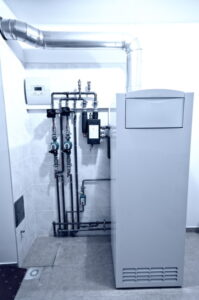The home heating boiler is a classic for a reason, and still popular enough for millions of Americans to use this type of heating system. The heat they provide is very even, avoiding the hot and cold spots that plague some forced-air systems, and they’re quite efficient. But the biggest selling point of a boiler is just how long they last.
While a boiler can last a long time, the biggest factor in whether they actually keep running is maintenance. So how long can they last if well-maintained?
Historical Boilers
In the past, boilers were huge, hulking things made of cast iron. They weighed many hundreds of pounds and were incredibly unwieldy to transport and install. So despite the fact that this type of boiler could run for half a century, it’s not the kind of heating system you’d want today.
Another difference is that these old boilers actually boiled. They didn’t send hot water through their systems of radiators, they sent steam! The pressures were very high, which, as you may imagine, was a safety hazard.
Modern Boilers
Today, most boilers are made of steel, and are smaller, lighter, and more streamlined than those of the past. They send water through pipes in registers or laid under flooring, and that water is well under 200 degrees Fahrenheit. These modern boilers are safer and easier to install. They also still last a pretty long time: up to 20 years!
Gas Boilers vs. Gas Furnaces
A gas furnace’s life expectancy is about five years less than a gas boiler. Why does a furnace only last 15 years? There are two main factors.
- Corrosion: This may come as a surprise, since furnaces don’t contain water. But they produce condensation which, in the interior environment of the furnace, is acidified. The pH of this moisture is similar to cola, and if you’ve seen any of those dissolving-a-chicken-bone videos, you know that’s pretty acidic. Boilers are specially coated to prevent corrosion, and the water they contain has a neutral pH.
- Mechanical Components: It’s the moving parts of any system that are the most likely to break or fail. Furnaces have a wide array of mechanical components like motors and fans, but boilers only have one main mechanical component: the circulator pump which keeps the hot water flowing through the pipes.
The Difference Maintenance Makes
Regardless of the type of heating system you have, getting annual maintenance done is the way to achieve those projected lifespans. Without maintenance, your heating system’s life will be years shorter. Maintenance reduces wear and tear by keeping the system clean and well-lubricated so friction and overheating won’t cause damage.
Your maintenance technician will also be able to spot any small concerns. If something is coming loose, getting rusty, or suffering from damage, it can be addressed right away. This eliminates bigger problems before they even occur.
Don’t forget to schedule your boiler maintenance in Grand Rapids, MN this fall!
Reach out to Mesaba Heating & Air Conditioning today. Service to you is success to us!

